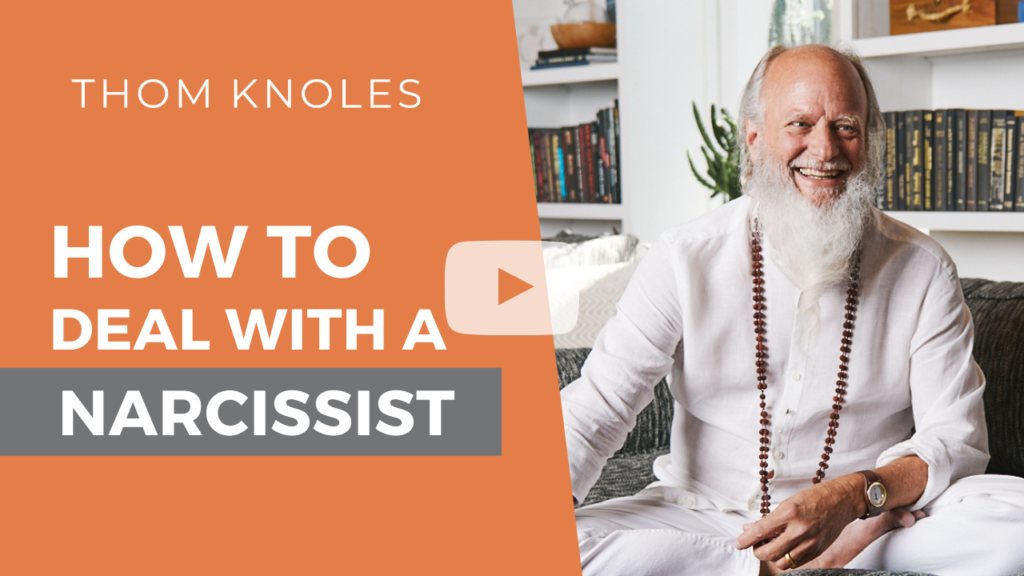Some of the best advice for any kind of relationship is to never take anything personally.
In the case of a person who displays narcissistic tendencies, we know that everything they do or say only has to do with them. Here’s a framework on how to deal with narcissists.
Underneath the self-obsession of a narcissist, there is a deeply insecure person who lets fear drive their thoughts and actions. Their minds race with thoughts about the best way they know to create safety: to control others’ perceptions.
Whether one needs to learn how to deal with a narcissistic parent or how to deal with a narcissistic spouse, Thom’s guidance can be vital and useful.
In the video below, Thom explains where narcissism comes from and recommends how to deal with it – and how to examine ourselves for our own narcissistic qualities.
6 Steps to Deal with a Narcissist
- Realize their condition comes from deep fear and insecurity.
- Avoid offering unsolicited opinions, advice, or comments with the intention to help, fix, or control them.
- Don’t base any of your own value or well-being on their actions or words, be self-sufficient.
- Focus on your own development – to what degree do you have narcissistic tendencies?
- Learn how not to behave from them.
- Create distance and don’t be involved with them.
When you recognize the unhealthy communication and relationship patterns of a narcissist, the best way to deal with a narcissistic partner or friend is to be 100% responsible for your participation with them.
Realize their condition comes from deep fear and insecurity.
Pitying another person is another form of pride – we give ourselves permission to think another is pathetic or sad. Rather than pitying the insecurity of another, we find the commonality. Each of us has fears and insecurities that we deal with, and each of us has the opportunity to transcend them. See that the narcissist has the same opportunity to transcend, and avoid making them wrong in your own judgments.
AAvoid offering unsolicited opinions, advice, or comments with the intention to help, fix, or control them.
As soon as you participate in the ‘black hole’ or the drama of a narcissist, your opportunity to help them has vanished. Offering a narcissist unsolicited advice will only play to their desire to manipulate.
Fixing, forcing, controlling, or ‘helping’ narcissists who do not ask for our input will only magnify the unhealthy pattern. A narcissist is out to fix, force, control, or help your behavior toward them already. When we involve ourselves in any way, all communication dissolves into a power struggle or manipulation game.
Don’t base any of your own value or well-being on their actions or words, be self-sufficient.
When we entangle ourselves in the drama and manipulation of a narcissist, we’ve become gullible to their opinion of us instead of being self-sufficient. Only an insecure person would believe someone else’s opinion of them to their own detriment. We allow fear and insecurity in ourselves when we base our values on a narcissist’s behavior.
The opportunity is to be sound in your own self, needing nothing from others’ opinions or behavior towards you. When we start to talk about deserving certain treatment or punishing another for treatment we ‘will not tolerate’ – we are only showing our fears that they are right.
A secure person doesn’t mind how others see them… they are free to only put themselves around people they enjoy.
Focus on your own development – to what degree do you have narcissistic tendencies?
Narcissism isn’t a black and white phenomenon. All of us have the tendency for self-preservation and the desire for relationships with others, so all of us show some degree of self-obsession in our lives.
Are we able to self-reflect? Can we take criticism well? Is it easy for us to acknowledge our own faults?
The uncomfortable fact is that when we find ourselves repeatedly attracting narcissists into our lives (or they are in our families)… we either show those tendencies or we show the insecurity that they can easily manipulate.
Having a healthy, distanced relationship with narcissists is possible. It requires patience, self-sufficiency, and self-awareness. This can be a good solution to how to deal with a narcissistic parent, for example.
Learn how not to behave from them.
Note that all of the behaviors that are hurtful or make you uncomfortable are great examples of what not to do in life.
Create distance and don’t be involved with them.
Ultimately, we are not forced to have a close relationship with anyone. We can freely choose who gets our time, trust, and attention. Creating distance or completely dissolving a relationship with a narcissist is the best way to deal with the behavior. Sometimes space is the best way to deal with a narcissistic boyfriend.
At some point, when the narcissist is under enough pressure, they will have a clear opportunity to look at themselves more closely and acknowledge their dysfunction.
As Vedic Meditators, we are less interested in asserting ourselves on others or proving anything. We are responding to the need of the moment gracefully and quietly, content to expand our consciousness with each 20-minute meditation session.
Jai Guru Deva

